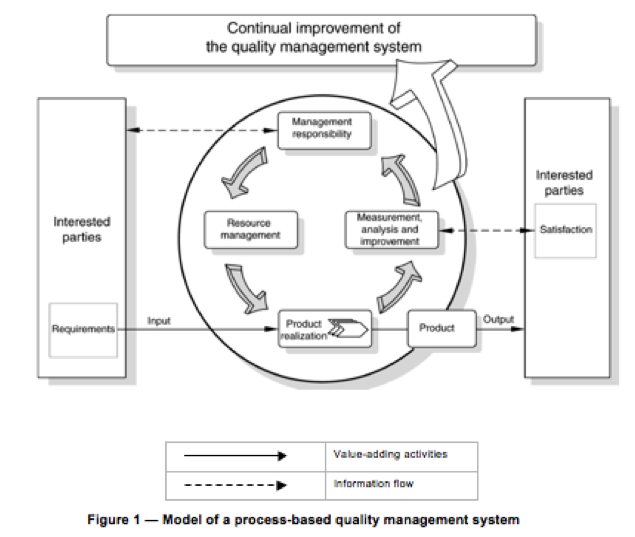 By the late 80s, it became apparent that Japanese cars were in many ways superior to their American counterparts. They were often more reliable and durable and they got better gas mileage. They were of superior quality. They often still are.
By the late 80s, it became apparent that Japanese cars were in many ways superior to their American counterparts. They were often more reliable and durable and they got better gas mileage. They were of superior quality. They often still are.
To what do the Japanese attribute their success? The teachings of W. Edwards Deming. The Japanese listened to Deming when Americans would not.
To many, Deming introduced the idea that the best way to assure product quality was to assure the quality of the processes that create product. The focus isn’t so much upon product, but how product is created. Deming was focused upon processes and process management. Akin to the old adage, “Mind your pennies and your dollars will take care of themselves,” Deming seemed to be saying, “Mind your processes and quality will take care of itself,” or, “Mind your quality and your business will take care of itself.”
In the 1940s, Deming’s focus on process management as a long-term solution to organizational profitability and stability was viewed by American management as being unprofitable. Deming suggested that this common short-term perspective on profitability was itself short-sighted, and that his ideas would prevail if only management would listen. More concerned with improving quarterly financial performance, they didn’t.
GOOD QUALITY MANAGEMENT IS GOOD BUSINESS ASSURANCE
Ignored at home, Deming took his show on the road. After WWII, circa 1947, Deming was among a team of professionals who went Japan to help rebuild after the war. Deming told the Japanese that if they would listen to him, they would become an economic powerhouse in the global economy. Deming allegedly even projected that it would take about forty years for his ideas to inundate the Japanese supply chain. If true, he was right about that, too.
I was a kid during the 70s. I remember when “Made in Japan” was virtually synonymous with “junk.” Yet by the mid 80s, true to Deming’s (alleged) timeframe prediction, “Made in Japan” was nothing to scoff at. Today, Japanese quality is superb. It’s not just cars and trucks, either. Look at their electronics, too. Today, “Made in Japan” means “quality stuff.”
The Japanese import materials, make product, and export it (even paying tariffs), and these products now consistently outperform competitors in the global market.
WHY?
Quality. Japan knows quality. More than making well-made products, quality is about making products well. It’s about quality of process. Japan knows, as Deming told them, that focusing on process is the way to success in business. Don’t just do it, do it well. Build it well and they will come.
Today, Deming is well-known in quality management circles, but not so much in board rooms. It seems strange that his teachings are not presented as being among the most important messages to business and industry.
More than a quality guru, Deming was a business guru. The Japanese prove it every day.
STILL IGNORING DEMING?
Not that American industry intends to ignore Deming, but many ISO 9001-certified organizations ostensibly are ignoring Deming. In an effort to become ISO 9001 certified, organizations commonly adopted an approach that confuses personnel about quality management.
The documented systems organizations commonly raised to pass ISO 9001 audits belie a natural process approach operating behind this poorly conceived documentation. These systems are designed to suit ISO 9001, when they should have been designed to suit their own processes, pursuant to the Plan phase of the Plan-Do-Check-Act cycle (PDCA).
The connection between the process approach and PDCA is made in ISO 9001:2000 and 2008, 0.2, Process approach. Here, a model of a process-based quality management system is presented. The model diagram “illustrates the process linkages presented in Clauses 4 to 8.”
Clause 4 contains general system requirements and documentation requirements. Clause 4 requires that QMS processes are identified (2000) or determined (2008). Requirements pertaining to those processes are contained beneath clauses 5 to 8.
The diagram below, Figure 1, is from ISO 9001:2000/2008, 0.2. It illustrates how clauses 5 to 8 correspond to the four phases of the Deming cycle. While QMS processes needed for a QMS can generally be viewed according to these clauses, these clauses do not purport to identify specific QMS processes.
Figure 1
Clause 6, Resource management, represent the Plan phase. Resources available to processing are configured as they are today due the result of management planning. The current configuration represents management’s plan for processing.
Clause 7, Product realization, represents the Do phase. Core processes of an organization work together to realize product.
Clause 8, Measurement, analysis, and improvement, represents the Check phase. Process performance and results are evaluated (against objectives established during the Plan phase) to determine opportunities for improvement.
Clause 5, Management responsibility, represents the Act phase. It is management’s responsibility to identify and implement improvements based upon opportunities presenting themselves in the Check phase. Improvements to resources available to processing (e.g., better equipment, better instructions) are implemented, and the cycle starts anew.
This is a model for continual improvement of a process, or a system of processes. According to the note associated with this process model, “the methodology known as ‘Plan-Do-Check-Act’ can be applied to all processes.” The process model of ISO 9001 is based upon the PDCA cycle of Deming. In a sense, the process approach IS PDCA, which IS Deming (and his mentor, Walter Shewhart). We will find that every future revision of ISO 9001 will endorse a process approach.
Not applying a process approach results in organizations bending over backwards to comply with ISO 9001. Ouch. People working in ISO 9001-certified companies feel the pain, often harboring a disdain for ISO 9001. Rejecting ISO 9001 is tantamount to rejecting Deming. The crux of this trouble was a failure to understand and apply a process approach in the first place.
For more information about the approach problem itself, please see:
- “Abolishing the Standard-Based Mind-set with ISO 9001” SAQI (The South African Quality Institute), e-Quality Edge, No. 171, Sept. 2013 https://docs.google.com/file/d/0B9JfgnGKRwahTXRCMHlzdlUtUTg/edit?usp=sharing ,
- “Psst—It’s Your Approach” (guest blog) RABQSA International, Oct. 14, 2013 http://www.rabqsa.com/20131014_nr_guestblog.html ,
- “Is ISO 9001 Working?” CERM (Certified Enterprise Risk Management) Risk Insights eMagazine, #29, Oct. 2013
http://insights.cermacademy.com/2013/10/29-is-iso-9001-working-t-dan-nelson/ , and
- “An ISO Approach Designed to Fail” CERM (Certified Enterprise Risk Management) Risk Insights eMagazine, #30, Nov. 2013
http://insights.cermacademy.com/2013/11/30-an-iso-approach-designed-to-fail-t-dan-nelson/
A LITTLE HELP FROM THE EDUCATION INDUSTRY?
A lack of education about quality management, the process approach, and how to apply it has allowed hundreds of thousands of companies worldwide needlessly struggle with quality management ala ISO 9001—which requires a process approach, but few seem to understand how to apply a process approach ala ISO 9001. They hurt themselves as a result.
After business and industry have needlessly struggled with ISO 9001 for decades, would it make sense at some point to provide education and good information about ISO 9001 and the process approach?
Why is quality management not taught in business schools? Education about quality management should be not only required, but a major focus. Yet MBA programs scarcely even mention quality management or Deming. Quality management is arguably one of the most important lessons business students can learn. The focus upon making money in the short term detracts from how money is made in the long run: by doing what you do well.
Today, MBA students are commonly taught all about marketing, advertising, accounting, etc., while quality management is often absent from the curriculum. The principles that brought Japan to prominence in this global economy are scarcely mentioned in business schools. A lack of education about Deming and PDCA has cost business and industry plenty already.
Wouldn’t it make sense to include basic quality management in MBA programs? More than that, since Deming has been proven to be among the world’s best business gurus, shouldn’t exposure to Deming’s message be required in business schools?
Bio:
T. D. (“Dan”) Nelson is a quality management consultant, author, and trainer specializing in the process approach, ISO 9001, and related sector schemes. Dan has roughly 20 years of experience with ISO 9000 and over 15 years’ experience with the process approach. Dan holds an MA in Business Administration from the University of Iowa. Dan can be reached at:
dan@tdnelson.com
319.210.2642

